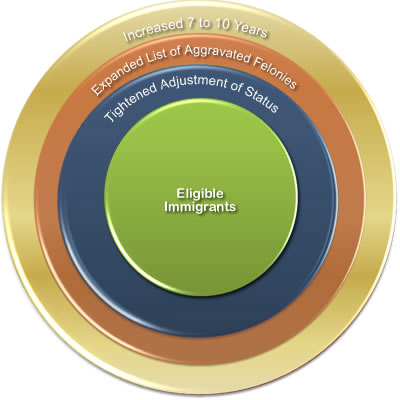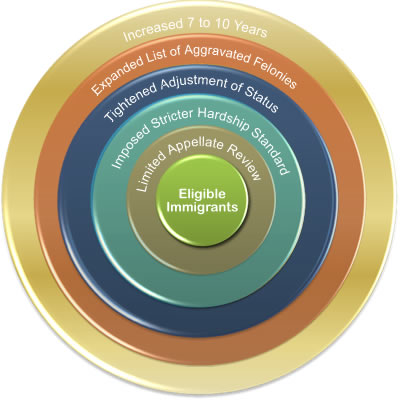
Back in my days as a political science professor, I would point out how candidates scapegoat politically powerless individuals for self gain.
Like undocumented immigrants.
Since they cannot vote, their ability to fight back is nearly non-existent.
Last week’s narrow proposal by the Obama administration, addressing the needs of some immigrants trying to adjust their status to lawful residents, is a stark reminder of this history.
However well-intended, the limited changes fail to offset the human misery inflicted by the 3 and 10 year re-entry bars – bars to legalization caused by political attacks dating back to 1996.
Legislative Attacks On Deportation Defense
In that year, seeking votes at the expense of politically powerless immigrants, Congress passed the Illegal Immigration Reform and Immigrant Responsibility Act (IIRAIRA).
Prior to IIRAIRA, many undocumented immigrants sought relief under Suspension of Deportation. To qualify, they needed to show 7 years of continuous physical presence, good moral character during this period, and an “extreme” hardship to himself or herself, or a U.S. citizen or lawful permanent resident spouse, parent, or child.

If these requirements were met, it did not mandate an immigration judge to approve an immigrant’s Suspension of Deportation application. It only meant the immigrant was entitled to a full hearing on the merits whether he or she deserved to have deportation suspended and a green card granted.
This was not restrictive enough for anti-immigrant politicians.
As discussed in Newt Gingrich: The Grinch Who Stole Immigration Reform, pushing a xenophobic “Contract With America” agenda, Congress replaced Suspension of Deportation with Cancellation of Removal.
Under Cancellation of Removal, immigrants now had to show 10 years of continuous physical residence, during which period he or she had to demonstrate good moral character.
The list of criminal convictions which precluded a finding of good moral character was expanded – a list which redefined many minor state misdemeanors as aggravated felonies under immigration law.
In addition, Congress tightened procedures related to obtaining permanent residence status through family member petitions. Some of these provisions, like the 3 and 10 bars, were the subject of media headlines this past week.
Each change led to a shrinking pool of undocumented immigrants eligible to fight against deportation.

Moreover, under IIRAIRA, Congress imposed a higher standard of proof – an elevated degree of hardship – upon immigrants seeking to defend themselves against deportation.
The “extreme” hardship standard under Suspension of Deportation was replaced by Cancellation of Removal’s “exceptional and extremely” hardship requirement.
Even this change could not satiate anti-immigrant forces.
Since the evaluation of hardship is a discretionary determination made by judges, poorly-reasoned decisions were still subject to legal challenge by immigration appeals based on abuses of discretion.
These appellate challenges opened the door for some immigrants to eventually prevail. Anti-immigration forces were unhappy, leading to yet another Congressional attack on the deportation defense process.
Thus, in 2005, under the REAL ID Act, immigrant appellate rights were curtailed. Congress limited appellate review of discretionary decisions of immigration judges to “clearly erroneous” errors.
As with the other changes passed by Congress, this legislative maneuver reduced the pool of immigrants eligible to fight back against removal and deportation.

The above diagrams tell the story.
Gradually, as these diagrams show, the rights of undocumented immigrants to fight removal from the United States has greatly shrunk in the past 15 years.
By political fiat.
For true immigration reform to happen, several layers of past legislative actions must be rolled back.
Such reversal cannot take place without strong political leadership.
Why The New “Family Unity” Proposal Is Too Lukewarm
Under current law, many undocumented immigrants, seeking to become green card holders, must return to their home country for their permanent residency interviews.
If they have lived here illegally for 180 days, they are subject to a three-year re-entry bar.
If they have lived here illegally for one year, they are subject to a ten-year re-entry bar.
This places them in a Catch-22 situation.
They must leave the U.S. to interview for their green card abroad, yet as soon as they leave, they are barred from re-entering the U.S. for three or ten years.
Under last week’s proposal – hailed as “family unity” by some media outlets – those who are immigrating via a U.S. citizen spouse or parent may now seek a waiver of the re-entry bar while still living in the U.S.
The proposal excludes immigrants seeking benefits through their U.S. children or siblings.
(As a Riverside immigration lawyer, this limitation raises an interesting question. Has the administration bought into the anchor babies rhetoric? Why else exclude undocumented parents from obtaining benefits through an adult U.S. child?)
The proposal also excludes all beneficiaries of family-based visa petitions filed by lawful permanent residents.
By failing to include all immigrants who could qualify as relatives of U.S. citizens and lawful permanent residents, the proposal likely addresses about 25% of those who have been negatively affected by the 1996 IIRAIRA re-entry bars.
In summary, the latest White House proposal, though positive, does not fully combat the adverse effects of the 3-year and 10-year bars set by Congress in 1996.
A stronger rollback is needed.
Back To The Past: Immigration Reform Today
Immigration laws before 1996 were not perfect. But they were far better, in many respects, than what is in place today. Especially for immigrants facing deportation.
In a nation which proclaims the importance of fair play in legal proceedings, due process at immigration court means immigrants should be guaranteed a chance to defend themselves against removal and an opportunity to legalize their status.
Nothing less is sufficient.
By Carlos Batara, Immigration Law, Policy, And Politics




